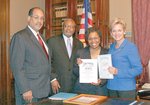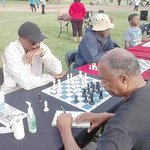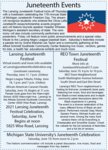




For many African-Americans, the sudden mass embrace of the Juneteenth holiday in 2021 smacks of Columbus “discovering” America.
The holiday goes back to 1865. Lansing’s own Juneteenth celebration (Thursday, June 17, through Saturday, June 19) has been going on for 28 years.
Belated recognition is baked into the story of Juneteenth (the name an apparent mashup of June and nineteenth). On June 19, 1865, enslaved African Americans in Texas were finally informed that slavery had ended, two months after General Robert E. Lee’s surrender and two years after Abraham Lincoln’s Emancipation Proclamation.
Separate bubbles of reality are nothing new in American politics. Until U.S. Army General Gordon Granger prepared General Order No. 3, months after Lee’s surrender, Confederate forces in Texas were still active — and winning — on the field, fighting the tide of emancipation.
It’s no wonder that many Juneteenth celebrations, including Lansing’s, have featured a costumed re-creation of General Granger reading his terse order: “The people of Texas are informed that, in accordance with a proclamation from the Executive of the United States, all slaves are free. This involves an absolute equality of personal rights and rights of property between former masters and slaves.”
For Greta McHaney-Trice, a volunteer in Lansing’s Juneteenth celebration committee, belated recognition of humanity is the central theme of Juneteenth, and of American history. She compared people who didn’t know about Juneteenth until recently to the freed slaves in Texas who didn’t know they were free until the first Juneteenth in 1865.
“Buried history is buried history,” she said. “Juneteenth, and what it stands for, is pivotal right now. It’s more relevant than ever. It needs to be celebrated by this whole union, not just for people of color. If you want a more perfect union, you’ve got to look at the imperfections.”
Another level
Juneteenth organizers are proud that members of Lansing’s Juneteenth committee, including the late Rev. Michael Murphy, the Rev. Dr. A. Richard Doss and Marilyn Rogers, led the push for the holiday’s official recognition in Michigan. The third Saturday in June was officially designated Juneteenth Celebration Day in Michigan in 2005.
Today, 48 states recognize Juneteenth as either a state holiday or ceremonial holiday.
“It’s gone to another level,” Doss said. “It has been linked with other movements growing around the country, such as Black Lives Matter. A lot of younger people are discovering Juneteenth and understanding how far back the struggle for the recognition of freedom and securing of rights has gone.”
Texas was the first state to recognize Juneteenth, in 1980. North Dakota was the most recent, in April of this year. Hawaii’s Legislature passed a bill recognizing the holiday April 27. If Gov. David Ige signs it, South Dakota will be the only holdout left.
“Juneteenth has gone from 0 to 60 on the American holiday celebration map in less than a year,” MSU English Professor Jeff Wray said. “But what a year, right?”
This year’s Juneteenth events ride a nationwide wave of pent-up, post-George-Floyd, post-Donald-Trump, post-COVID emotions crying for an outlet.
Wray, who teaches English and African-American film, has never seen anything like it.
“The suddenness of this awareness and celebration is a bit mind boggling and a little desperate,” he said.
The reason, Wray said, is in plain sight.
“A serious discussion of reparations or addressing the wealth gap with concrete moves seems remote,” he observed. “But a broad cultural and corporate embrace of Juneteenth is and can be done quickly.”
Wray is pleased, but wary, about the current surge of interest.
“Elevating Juneteenth feels good, and is good, and it is doable,” he said. “I have not seen a Juneteenth Hallmark card yet, but … .”
Artist Julian Van Dyke, a longtime Lansing Juneteenth board member, pitches in to organize and set up the event and helps with educational outreach to local schools. He painted the Lansing Juneteenth logo and rendered this week’s City Pulse cover.
“I don’t want to throw shade on anybody, but a lot of people of color did not know what Juneteenth was,” Van Dyke said. “If you asked me 20 years ago, I couldn’t have told you. Last year, with Black Lives Matter, and especially after George Floyd case happened, we were reaching out for something we could celebrate, and it was Juneteenth. You have the spiritual need and movement to grasp onto something, and Juneteenth was it.”
Starting small
Lansing’s Juneteenth celebration took root almost 40 years after Gordon Haskins, a longtime member of Mask Memorial CME Church, 5601 S. Waverly Road, came to Michigan from Douglasville, Texas, in 1954.
For years, Haskins took his family to Lake Lansing Park each Juneteenth for a small, private celebration of half a dozen people or so.
In the early 1990s, Haskins began to lobby other church members to start a local Juneteenth celebration. Among these were Debra Plummer, who had just returned to Lansing after living in Wisconsin and California for more than 15 years, and her sister, Marilyn.
Debra Plummer had witnessed Juneteenth celebrations in Milwaukee, but Marilyn Plummer, now Marilyn Rogers, said the holiday was almost unknown in Michigan.
“I’m a Northerner,” Rogers said. “Not many of us in the congregation knew about it. We hadn’t put too much thought into it because we couldn’t identify with it. Gordon told us he felt we should learn about Juneteenth, and we should start celebrating, so the city and the community would know about it.”
In her 2021 book, “On Juneteenth,” Pulitzer Prize-winning author Annette Gordon-Reed, a native of Texas, confesses that she was “mildly annoyed” at first when other states took up the holiday, but she has since changed her mind.
“It’s really a very Texas move to say that something that happened in our state was of enough consequence to the entire nation that it should be celebrated nationwide,” Gordon-Reed writes.
The Lansing celebration started small at Mask Memorial, as a dozen or so members gathered at 4 p.m. on Father’s Day 1993 to hear a guest speaker Haskins corralled from Texas to teach the members about the holiday’s history.
The setting was apt. At first, Juneteenth was celebrated almost exclusively in churches across Texas, as the post-emancipation 1860s unleashed a wave of white backlash against freed Blacks across the state. Open celebration was met with violent reprisals, and an understaffed federal Freedmen’s Bureau struggled to keep the streets calm and enforce the emancipation order. But joy burned brightly in those days, too. Slavery was fresh in the memory of Gordon-Reed’s grandparents and their friends.
“Black Texans were determined, despite the early intimidating anger of whites, to celebrate what was initially called Emancipation Day,” Gordon-Reed writes in “On Juneteenth.”
Juneteenth made its way out of the church, but the church has never left Juneteenth. Urging Lansing organizers to think beyond the church, Haskins told the Mask Memorial congregation about four Black Houston men who pooled their money in 1872 and bought a park, which they called Emancipation Park, where the holiday could be celebrated in the open. In segregation times, it became a city-owned park where Blacks could safely gather.
Back in Lansing, Debra Plummer, Marilyn Rogers and other church members began to form a committee. The event grew into an outdoor picnic and barbecue, with theatrical “Jubilation Day” presentations in the grassy backyard recreating the reading of General Order No. 3 and the rejoicing that followed. Baseball and softball games were added in subsequent years, some of them honoring the history of the Negro Leagues.
Year by year, the event outgrew the church until it moved to Riverfront Park in downtown Lansing in 2001, then to Benjamin Davis Park in south Lansing from 2002 to 2005, and finally to St. Joseph Park on the southwest side, where it is still held.
The committee formed a nonprofit and began to work closely with the city, applying for grants to supplement the donations of church and community members.
Van Dyke is proud that the event has endured, uninterrupted, for so long. “Debra and Marilyn were instrumental in putting in the effort to keep it going in Lansing,” Van Dyke said. “A lot of people don’t know the effort they went through.”
Ask any one of the committee members what they do and you are likely to get a shrug, as if to say, “What don’t I do?”
“It’s a small group of grass-roots community members,” McHaney-Trice said. “We all do what we got to do.”
‘We’ve always had Juneteenth’
Rogers said this year’s event is a “hybrid program” beginning Thursday (June 17) with a virtual kickoff ceremony recognizing the Juneteenth Essay and Scholarship winners.
By now, the history of Juneteenth is widely known, or at least easily accessible. This weekend’s keynote speaker will set aside the customary origin stories and bring home the holiday’s relevance in the current political landscape.
Heaster Wheeler, Michigan’s assistant secretary of state, will run down widespread legislative measures meant to restrict voting rights, in Michigan and other states, and detail state and local efforts to push back.
“He’s sharp, quick-witted and right to the point, and we’re looking forward to his message,” Rogers said.
Friday will feature an online tribute to the Negro Leagues and major league great Hank Aaron, with the participation of legendary Sexton High School educator Dan Boggan, a community pillar for decades and the winningest football coach in the school’s history.
The big day, Saturday, will start with a caravan parade of decorated vehicles (including decked-out bicycles) from Wainwright School to the Alfreda Schmidt Southside Community Center, a COVID-era replacement for the customary parade on foot. The parade grand marshal is Lee Taylor, longtime activist and leader of community programs for at-risk youth.
After the caravan, an African drummer will lead a procession from the community center parking lot to the main stage, Lansing Mayor Andy Schor will read a proclamation and the festivities will begin. Rogers has asked Alfreda Schmidt herself to make an appearance at the community center that bears her name, health permitting. The African Masquerade Dancers, a Lansing-area youth dance troupe, will take the stage, along with other performing youth groups.
Food and merchandise vendors offer up a head-spinning swirl of sights and smells. Inveterate traveler, educator and Lansing resident Willie Davis Jr., also known as Babakubwa Kwefu, will bring artifacts from his “All Around the African World Museum.” A slate of musical performers, including Washington, D.C.-based gospel star Tim Bowman, will provide the soundtrack.
In a pandemic-era wrinkle, a COVID vaccination clinic will be set up on the festival grounds.
“If it rains, we’ll come back when the sun comes out,” Rogers said. “We’ve had all kinds of weather you can imagine over the years, but we’ve always had Juneteenth.”
Visitors will have a chance to sign the petition to make Juneteenth a national holiday. Steve Williams, president of the national Juneteenth Observance Foundation, will join the virtual events Thursday. Williams calls Juneteenth “America’s second independence day“ and “the completion of the celebration of freedom in America.”
Greta McHaney Trice agrees with Williams that the holiday’s mix of joyful celebration and solemn remembrance gives it a unique power in the soul-searching, divided America of 2021.
“Juneteenth is, for me, far beyond a parade, far beyond some food, people gathering and whatever,” she said. “It is Black African Americans legally beginning to reclaim their humanity. It’s an observance of legal humanization in a very dehumanizing condition that is ongoing. That’s worthy of celebration.”
Richard Doss is looking forward to watching the kids run around, the old folks play chess and the lovers dance to the music. Doss hasn’t been going out much lately, but the chance to celebrate freedom after a year of COVID restrictions is too much for him to resist.
“Most of all, I will enjoy the fact that we can celebrate face to face,” Doss said. “I admit, I will be a little nervous, because I haven’t been around a lot of people. I’ve had both my shots, but if I get to feeling challenged, I’ll put on the old mask and I’ll sit there and take it in.”
Support City Pulse - Donate Today!
Comments
No comments on this item Please log in to comment by clicking here